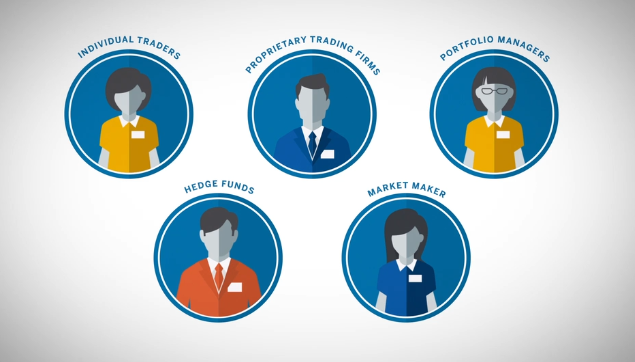What Are Speculators?
Speculators are primary participants in the futures market. A speculator is any individual or firm that accepts risk in order to make a profit. Speculators can achieve these profits by buying low and selling high. But in the case of the futures market, they could just as easily sell first and later buy at a lower price.
Obviously, this profit objective is easier said than done. Nonetheless, speculators aiming to profit in the futures market come in a variety of types. Speculators can be individual traders, proprietary trading firms, portfolio managers, hedge funds or market makers.
Individual Traders
For individuals trading their own funds, electronic trading has helped to level the playing field by improving access to price and trade information. The speed and ease of trade execution, combined with the application of modern risk management, gives the individual trader access to markets and strategies that were once reserved for institutions.
Proprietary Trading Firms
Proprietary trading firms, also known as prop shops, profit as a direct result of their traders’ activity in the marketplace. These firms supply their traders with the education and capital required to execute a large number of trades per day. By using the capital resources of the prop shop, traders gain access to more capital than they would if they were trading on their own account. They also may have access to the same type of research and strategies developed by larger institutions.
Portfolio or Investment Managers
A portfolio or investment manager is responsible for investing or hedging the assets of a mutual fund, exchange-traded fund or closed-end fund. The portfolio manager implements the fund’s investment strategy and manages the day-to-day trading. Futures markets are often used to increase or decrease the overall market exposure of a portfolio without disrupting the delicate balance of investments that may have taken a significant effort to build.
Hedge Funds
A hedge fund is a managed portfolio of investments that uses advanced investment strategies to maximize returns, either in an absolute sense or relative to a specified market benchmark. The name hedge fund is mostly historical, as the first hedge funds tried to hedge against the risk of a bear market by shorting the market. Today, hedge funds use hundreds of different strategies in an effort to maximize returns. The diverse and highly liquid futures marketplace offer hedge funds the ability to execute large transactions and either increase or decrease the market exposure of their portfolio.
Market Makers
Market makers are trading firms that have contractually agreed to provide liquidity to the markets, continually providing both bids and offers, usually in exchange for a reduction in trading fees. Market makers are important to the trading ecosystem as they help facilitate the movement of large transactions without effecting a substantial change in price. Market makers often profit from capturing the spread, the small difference between the bid and offer prices over a large number of transactions, or by trading related futures markets that they view as being priced to provide opportunity.
Conclusion
All types of speculators bring liquidity to the market place. Providing liquidity is a crucial market function that enables individuals to easily enter or exit the market. Though speculative trading activity generates considerable liquidity, all market players benefit. In contrast to speculators who aim to profit by assuming market risk, some buyers and sellers have a vested interest in the underlying asset of each contact. These market participants aim to offset or eliminate risk and are referred to as hedgers.
Definition taken from: CME Group


